April 26, 2024
A Digital Archive of Islamic Knowledge

The Hanafi Stance on Combining Prayers During Travel

Why don’t Hanafis combine prayers, when there are authentic hadiths about it?
In the Name of Allah the Inspirer of truth.
This issue is a major one between the fiqhi schools. The Hanafis have judged all the narrations on this issue to be based on the method of “apparent combining” ( Jam’ al-Suri ) not “real combining” ( Jam’ al-Haqiqi ). What this means is that since we are told to make every prayer on time, and there are hadiths of Ibn Mas’ud (R) which clarify that the Prophet, sallallahu `alayhi wa sallam , never combined the prayers together (by taking a prayer out of its time) except in ‘Arafa and Muzdalifa during the [Hajj] pilgrimage.
The following, which is an excerpt the from the Fiqh al-Imam (third edition) currently under publication, [1] may be useful in understanding the hadiths on this issue:
From the Chapter on “Combining Two Prayers”:
‘Abdullah ibn Mas’ud (R) relates:
“I never observed the Messenger of Allah sallallahu `alayhi wa sallam perform any prayer out of its time except at Muzdalifa. He combined Maghrib and ‘Isha at Muzdalifa.” ( Sahih al-Bukhari 1:227, Sahih Muslim 1:417, Sharh Ma’ani ‘l-athar 1:164)
Another narration of Ibn Mas’ud (R) states:
“The Messenger of Allah combined two prayers whilst on a journey. He would combine Maghrib and ‘Isha by delaying Maghrib until just before its expiry time, and performing ‘Isha immediately as its time entered.” ( Musannaf Ibn Abi Shayba 2:458)
‘A’isha narrates: “The Messenger of Allah, whilst on a journey, would delay Zuhr and perform ‘Asr early and would delay Maghrib and perform ‘Isha early (i.e. perform each prayer in its own time).” ( Sharh Ma’ani ‘l-athar 1:164, Musannaf Ibn Abi Shayba 2:457)
Ibn ‘Abbas (R) narrates:
“I performed eight rak’ats together (four of Zuhr and four of ‘Asr) and seven rak’ats together (three of Maghrib and four of ‘Isha) with the Messenger of Allah.” (One of the narrators says,) “I asked Abu ‘l-Sha’tha’, ‘I assume he delayed Zuhr (to the end of its time) and performed ‘Asr as soon as it entered, and delayed Maghrib (likewise) and performed ‘Isha early.’ He replied, ‘I also think the same.’ ” ( Sahih Muslim 1:246, Musannaf Ibn Abi Shayba 2: 456)
This hadith of Sahih Muslim is very clear about the exact description of combining two prayers. The method described by the narrator is Jam’ al-suri .
Imam Abu Dawud has transmitted the following:
The Mu’adhdhin of ‘Abdullah ibn ‘Umar (R) informed him it was time for prayer. Ibn ‘Umar instructed him to continue on the journey. When the red of sunset ( shafq ahmar ) had nearly disappeared, he got of from his mount and performed Maghrib, and then he waited until the red had completely disappeared and performed Isha. He then said, “Whenever the Messenger of Allah (S) was in a hurry for some reason, he would do just as I have done.” ( Sunan Abi Dawud 1:178)
As we can see, the method of combining mentioned in the above hadiths is none other than that of jam’ al-suri . It is an agreed upon method which nobody has any argument with. How can there be an objection to two prayers being performed together in a way that does not cause them to be performed either before their stipulated time or after it? Undoubtedly, this is the safest method of combining two prayers, and would be the most suitable way to explain the hadiths on combining.
It is also common knowledge that the Fajr prayer should not to be performed before its time or intentionally delayed beyond it. Similarly, other prayers should not be performed out of their stipulated times either, especially not while considering it to be sunna . This indicates that the sunna method of combining two prayers is jam’ al-suri , as has also been substantiated through the Qur’an and hadiths. This is the Hanafi opinion in this issue.
If it was permissible to practice jam’ al-haqiqi in the event of travel or illness, etc. then why is it confined to some prayers only? Why is it not permissible to perform all the prayers of the day together in the morning before departing on a journey? The reason for this is quite simple. The practice of combining mentioned in the hadiths is not to be taken as jam al-haqiqi , but as jam al-suri wherein each prayer remains in its own time, but are performed one after another.
And Allah knows best.
Wasallaam Abdurrahman ibn Yusuf
[1] The book Fiqh al-Imam by Mufti Abdur Rahman ibn Yusuf has already been published by White Thread Press.
Courtesy of ZamZam Academy
Share this:
- Click to print (Opens in new window)
- Click to email a link to a friend (Opens in new window)
- Click to share on Pocket (Opens in new window)
- Click to share on Twitter (Opens in new window)
- Click to share on WhatsApp (Opens in new window)
- Click to share on Telegram (Opens in new window)
- Click to share on Facebook (Opens in new window)
- Click to share on Reddit (Opens in new window)
- Click to share on Tumblr (Opens in new window)
- Click to share on Pinterest (Opens in new window)
Published in Fiqh , Prayer and Rulings
- combining prayers
- fiqh of travel
- hanafi fiqh
- shortening prayer
Comments are closed.

Special Events
Salah During Travel (Qasr)
Praying 5 times a day is an obligation upon Muslims. However, Allah has allowed His servants to shorten their Salah during travel.
1- Why Should We Follow Qasr Salah During Travel?
The Messenger of Allah (S.A.W.) said,
“Verily, Allah loves for you to take His concessions , just as he dislikes you to be disobedient.” (Musnad Ahmad: 5832)
The shortening of prayers is mentioned in the Quran and is a confirmed Sunnah of Prophet Muhammad (S.A.W.):
“And when you travel throughout the land, there is no blame upon you for the shortening Prayer” (Quran 4:101, An-Nasai: 457)
Hence, for travelers, it is permissible to shorten those Prayers that consist of 4 Rakat to only 2 Rakat (i.e. only Fardh Prayer of Dhuhr, Asr & Isha Salah).
2- Opinion of Different Fiqh:
According to Imam Shafii (R.A.) and Imam Ahmad bin Hanbal (R.A.), Reduction in the Prayer is not obligatory but merely optional. However, it is better to shorten it.
Imam Abu Hanifah (R.A.) considers ‘Reduction in Prayer'’ as obligatory (Wajib) during travel .
3- Conditions for Qasr:
Travelling Distance
According to Imam Abu Hanifa, the minimum required distance for a person to be considered a traveler is when he or she intends to travel for 48 miles (80 kilometers approx) from his/her Waṭan-e-Aṣli (Original Hometown).
Imam Shafi'i, Imam Ahmad bin Hanbal and Imam Malik fixed this distance at 55 miles approx (88 km approx).
Shortening of the prayers commences once a person leaves the city limits and ceases when they re-enter the city limits.
Period/Time
There is considerable scholarly disagreement on this matter from three days to four and to fifteen days.
Traveler-status is the intention to stay at the place of arrival for a period of:
Less than Fifteen (15) days [Hanafi]
Less than Four (4) days [Hanbali, Maliki and Shafii] - (Days of arrival and departure are not included)
4- How to do Taqseer (shortening of Prayers):
During travel, only Salah with 4 Rakat Fardh is to be shortened, i.e. Dhuhr, Asr & Isha. Travelers should offer 2 Rakat instead of 4 Rakat of the mentioned Salahs.
However, 2 Rakat Fardh of Fajr and 3 Rakat of Maghrib Salah must be offered in full as you cannot cut 2 or 3 Rakat Fardh Salah in half.
When on a journey, the Prophet (S.A.W.) used to offer, without fail, 2 Sunnah Rakat of Fajr Prayer and 3 Rakat Witr with Isha Prayer . So these two should be offered even during traveling.
Remember that these rules are only for a person who is traveling and offering individual Salah. If the traveler is praying in congregation then he must follow the Imam and offer the full Salah.
The Quran, written centuries ago, contains profound hints at future discoveries. It includes scientific facts that surpass the knowledge of anyone who lived in the 7th century. This serves as compelling evidence of the divine nature of the Quran.
This year, Nisf Shaban (Shab-e-Barat) will start after the sunset of Tuesday, March 7th, 2023.
Isra wal Meraj is a journey of faith and revelation that the Prophet Muhammad (S.A.W.) took from Makkah to Jerusalem and then to the 7th Heaven.
Isra and Miraj (The Night Journey) is miraculous journey that Prophet Muhammad (S.A.W.) took in one night from Makkah to Bait al-Maqdas and then an ascension to the heavens.
* user name and email shouldn't be left empty

number of rakats For traveller
Posted by Ahmed Abdulla | Prayer
A common question which is often asked while travelling is (1) Can I shorten the prayer while travelling, (2) if yes, how many rakats should I pray for Salah?
We have answered (1) in detail and you can see the discussion on Shortening and combining prayer while travelling .
The summary:
- Yes it is both mentioned in the Quran and is the Sunnah of the Prophet, peace and blessings upon him, to offer the shortened prayer while travelling.
- The conditions are you are travelling outside your city or beyond 88km and you plan your stay to be less than fifteen days (according to Hanafi Fiqh). If for unforeseen circumstance, you are compelled and stuck there you can continue offering the Qasr salat as long as your unable to return. This can be weeks, months or years.
With regard to the number of rakats offered for Salah we will answer it here.
It was narrated that ‘Umar said: “The prayer for jumu’ah is two rak’ahs, and for Al-Fitr is two rak’ahs, and for An-Nahr is two rak’ahs, and for traveling is two rak’ahs, complete and not shortened, on the tongue of the Prophet (ﷺ).” Grade: Sahih (Darussalam) Reference: Sunan an-Nasa’i 1440
It was narrated that ‘Umar said: “The prayer while traveling is two Rak’ah, and Friday is two Rak’ah, and ‘Eid is two Rak’ah. They are complete and are not shortened, as told by Muhammad (ﷺ).” Grade: Sahih (Darussalam) Sunan Ibn Majah
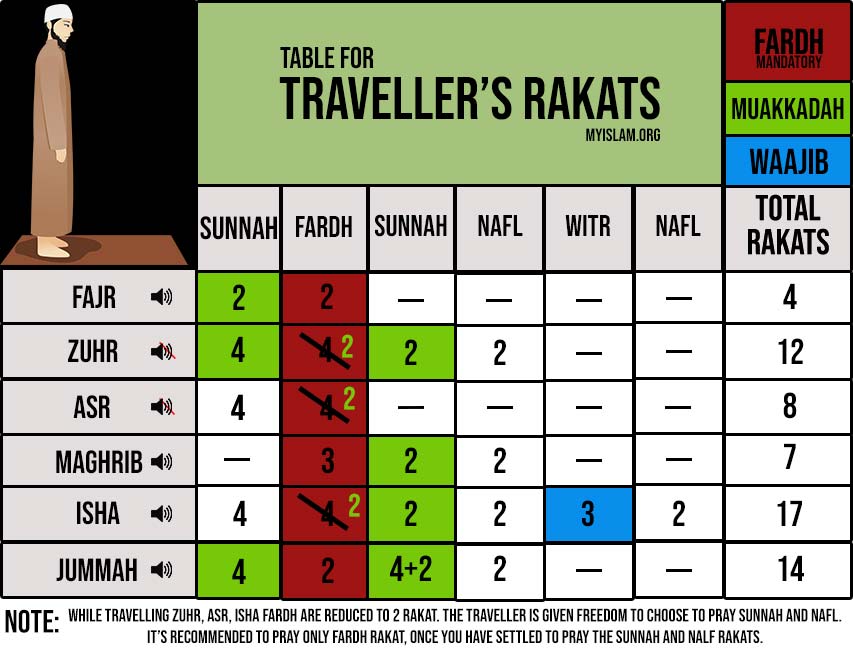
Number of Rakats While Travelling:
Fajr – 2 Fardh Zuhr – 2 Fardh Asr – 2 Fardh Maghrib – 3 Fardh Isha – 2 Fardh
With regards to the Sunnah and Nafl salat, the travellers had the choice as to whether or not this will be offered. It is advised once the traveller has settled that he should pray the Sunnah and Nafl prayers.
Some scholars are under the opinion that Fajr sunnah and Witr prayer should be prayed even during the stay or travel as it’s strongly emphasized. There is no shortening of the Nafl, Maghrib or Fajr Salat.
Inshallah this clears up any confusion you may have had. Please leave a comment below if this helped or if you believe we have made a mistake anywhere.
Related Posts

how many rakats in jummah prayer? (sunnah prayer Before and After jummah)
March 28, 2020
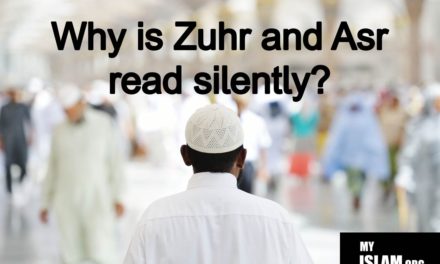
Why is Zuhr and Asr Read Silently?
April 20, 2020
What is the Tasbeeh For Ruku And Sajdah?

Can I Pray Salah With Nail Polish On?
April 19, 2020
19 Comments
Jazakallah very helpful.
Jazaqah llahu khaira, I used to pray all the raqaa as the way their when I’m traveling but ,,rightnow I understand the number of raqaa And if possible may you please create the group for whatsup because in my side my phone can’t access an email
Jazak Allah Khair, very useful information
https://www.youtube.com/watch?v=P7RHDzp_kQw Please write “in shaa Allah” properly. Reference is the link above.
Asalamuwalaikum, 2 questions please 1) i regularly go to visit my inlaws who live 100km away from my home. I usually visit for 1 week. Whilst there can i shorten my prayers as i am considered a traveller? 2) can i join my prayers for example asr with with zuhr and isha + witr with my maghrib salah? Is this permissable? I appreciate your comments and thoughts.
I travel for a month can I conflict may prayer
Assalaamu alaikum,
I read this article while I was traveling by plane. Prayed Isha with thus guidance.
Jazākallahu khairuh
Very useful information. JK!!
Mashaallah thank you
: Assalamualaikum wa Rahamatullahi wa barakatuh.Iam working 140km to my hometown(Nellore) .There I am staying 30 days and above .Then I come back to my home for3 or 4 days and go back to my job.At my job place(medarametla,Ongole) I prayed full rakat of zohar, asar, and isha.But now my job place was changed to more 40km(chilakaluripet).There I am working for 3 or 4 days and comeback to original job place (Medarametla)her I am working for 2 or 3 days and go back to previous work place (chilakaluripet).This will happened continuously. How I perform my namaz in above mentioned places is in Medarametla and in Chilakaluripet.Now I am praying khasar namaz in two places. And when to my hometown I pray full namaz.please kindly give me answer as quickly as possible.
If every almost two weeks or three weeks I travel to my mother’s home am I supposed to shorten my Salah for almost 3days or just because that’s where I was born it’s like my home am also supposed to pray all the 4 rakats in full thanks
Jazakallah khayran very useful.
Salaams . Why should we pray nafl and sunnah as a traveller , when we shortened our fardh salaah and fardh is more imp than sunnah and nafl.
Just need to ask for how many jumma rakats while travelling
When praying in masjid When not praying in masjid
Informative!
We can observe travel rakkah for how many days?
is when you travel more than 50 MILE
Jazakhallah very useful to know how many rakaats to pray If you’re a traveller
I’m traveling for 21 days overseas. I already know it is more than 15 days. During travel to destination I made the kasr (shortened) but upon arrival I started as normal thiugh I was exhausted and it was difficult to pray the normal length with sunnahs and nafils (i.e, complete namaz). Could I have done the shortened prayer for 15 of the 21 days or I’m correct in starting off the complete prayers upon arrival. I realize Allah has offered flexibility and ease in our madhhab, but I’m unclear about this matter.
Leave a reply Cancel reply
Your email address will not be published. Required fields are marked *
Support the site?
“Take on only as much as you can do of good deeds, for the best of deeds is that which is done consistently, even if it is little.” – Sunan Ibn Majah 4240
Need more info? Read our 2023 Annual Report
About Islam
- # Quran 382 Articles
- # Spirituality 382 Articles
- # Discovering Islam 382 Articles
- # Shariah 382 Articles
- # Videos 382 Articles
- # Family & Life 382 Articles
- # Fatwa & Counseling 382 Articles
- # Muslim News 382 Articles
- # Youth Q & A 382 Articles
- # Donate 382 Articles
- Ask the Scholar
Praying while Traveling: How?
Wa`alykum As-Salaamu Warahmatullahi Wabarakaatuh.
In the Name of Allah, Most Gracious, Most Merciful.
All praise and thanks are due to Allah, and peace and blessings be upon His Messenger.
In this fatwa:
There is general consensus among scholars that if a traveling person is determined to return as soon as his work is done and does not know when that will be, then he may continue to pray q asr as long as he is on travel.
" title="Advertise and Market to Muslims" target="_blank">Ads by Muslim Ad Network
In his response to the question you posed, Sheikh Ahmad Kutty , a senior lecturer and an Islamic scholar at the Islamic Institute of Toronto , Ontario, Canada, states:
- There is general consensus among scholars that if a traveling person is determined to return as soon as his work is done and does not know when that will be, then he may continue to pray q asr as long as he is on travel.
If, however, a person decides to settle down in a city, the moment he does so, he ceases to be a traveler, and, therefore, he must pray full.
If, on the other hand, one is determined to stay only for a few days the number of which he knows precisely, then he should pray full, according to a great number of scholars, if his stay exceeds more than four days. The Hanafi School, however, puts the number of allowable days at fifteen, while a third group of scholars put it at eighteen.
The first view seems to be the safest view to follow, as it has been based on the Prophet’s practice. According to authentic reports, he stayed in Makkah for four days, and during his stay he prayed q asr ; he had already known in advance how many days he would be staying. He is reported to have prayed qasr for eighteen and twenty days on two different occasions, when, most likely, he had no idea as regards the number of days he would be staying.
Having said this, I should rush to state that if anyone follows the position of the Hanafi School, he should not be blamed for his action, for theirs is a Fiqh – ruling based on acceptable practices of the Salaf as-Salih (pious predecessors). Since it is merely a question of differences of interpretation based on valid Ijtihad (creative exercise of reasoning), one should never make a big issue out of such differences of opinion among Imams.
- The most accurate way to count the number of days for a traveler is to consider oneself a traveler only after one has crossed the boundaries of his city of residence.
Thus, in case of people living in Toronto, if they are in a long distance journey, they will be considered travelers only after they have crossed the boundaries of GTA. The days of stay are calculated by excluding the day/days of going and returning.
- Yes, according to the vast majority of scholars and Imams, it is perfectly allowed for a traveler to combine Zhuhr and Asr , and Maghrib and Isha.
This ruling (known as Jam` ) is based on the authentic traditions which clearly state that the Prophet (peace and blessings be upon him) had combined Zhuhr and Asr as well as Maghrib and Isha on a number of occasions while traveling.
According to the Hanafi School, however, combining prayers is allowed only during Hajj while performing the rite of standing in `Arafah . At other times, they allow only what is often termed as Jam suwari (a kind of combining): By this they mean to say that you are allowed, for instance, to delay Zhuhr and pray it at the last time of Zhuhr and then pray Asr at the first time of Asr.
The majority view allowing combining of prayers as mentioned earlier has been considered to be the most authentic; it has been adopted later by many scholars belonging to Hanafi School as well.
- While combining prayers, you are allowed to make either taqdim (advancing) or ta’khir (delaying): In other words, you are allowed to advance the second prayer to the time of the first prayer.
Thus, if you are combining Zhuhr and Asr , you can first pray Zhuhr, and then advance Asr by praying immediately, or if you wish you can defer praying Zhuhr until the time of Asr and then pray Asr afterwards. The same procedure applies to combining Maghrib and Isha as well. at the time of arrives, in which case, you will first pray.
An important word of caution concerning Jam` is that there is no combining of Fajr with Zhuhr, or Asr with Maghrib, or Isha with Fajr.
It is also worth mentioning that while praying qasr during travel is highly recommended—some Imams such as Abu Hanifah even consider it as obligatory—during travel, praying Jam` is only allowed while one is actually traveling or pre-occupied with pressing circumstances. Jam` is rare, while qasr is common.
A final remark to be made is that if a person is aimlessly wandering, he is not considered a traveler and is, therefore, not allowed to make use of the allowances of qasr and Jam` .
Allah Almighty knows best.
Editor’s note: This fatwa is from Ask the Scholar’s archive and was originally published at an earlier date.
Privacy Overview
Lessons in Hanafi Fiqh
This Weblog is a series of lessons and articles in fiqh according to the school of Abu Hanifah. They are not necessarily published in the order that they should be read.
Tuesday, January 04, 2005
- The prayer of the traveler
The distance that makes one a traveler
- The travelling by which rules change (fasting Ramadan, prayer subset numbers, permissability of female travel, duty of Friday and Eid prayers, duty of slaughtering in Eid, the period for which one may wipe the khuff) is the one for which one intends (i.e. starts travelling wanting) to travel the distance of 3 complete days and nights at the average pace of a person on foot or riding a camel. Today this is estimated by about 98 kilometers.
- Travel by sea is not estimated according to travel by land. Instead, one estimates according to normal conditions of travel by sea.
- The sinful and the obedient (to Allah) in his traveling is the same with regards to its license.
The description of the travelers prayer
- The obligatory prayers of the traveller with 4 subsets are reduced to 2 subsets ONLY (not optional).
- If a traveller prayed 4 subsets and sat (the time it takes to say the tashahhud) after the first pair, then the first pair become the obligatory prayer and the second an optional prayer. However, he has done something bad by delaying the salaam of the obligatory prayer.
- If a traveller prayed 4 subsets and did not sit (the time it takes to say the tashahhud) after the first pair, then his obligatory prayer is invalid. This is because he effectively entered an optional prayer before he completed the obligation.
- The one who missed a prayer while traveling, and makes it up after settling, prays it by 2 subsets. The one who missed a prayer while settled, and makes it up while traveling, prays in 4 subsets.
Group prayer with travelers
- If a traveller entered as a follower behind a settled person in a 4 subset prayer, in the time of that prayer, then he competes 4 subsets.
- If a traveller entered (note that it is the time of entry that matters) behind a settled person in a 4 subset prayer, after the time of the prayer has expired, then his prayer is invalid. This is because it is now making up a prayer for him and he is supposed to make up 2 subsets, not 4.
- If a traveller leads settlers, then he says the salaam after 2 subsets while the others complete 4. They complete the 3rd and 4th subsets without reciting, but must recite in any subsets that they did not catch.
- It is a virtue for the leader who is a traveller to say "complete your prayers, because we are travellers!" after having said the salaam.
Start- and end-points of being a traveler
- If the traveller went beyond the buildings of his place of settlement, then he starts praying 2 subsets.
- After exiting the town, he remains a traveller until he intends to settle in a town or village for 15 days or more. If he intended less, he will remain a traveller.
- Settlement in the middle of the desert is not valid for ending the state of being a traveller.
- If the traveller entered a town with the firm intention of leaving "tomorrow or after tomorrow", and never intended to stay for 15 days, then he shortens his prayer, even if years pass by.
- If the muslim troops entered the warzone (non-muslim land) and intended to settle, they still shorten their prayer, even if they besieged a town or a fortress. This is because they are in the state between victory thus settlement and defeat thus retreat, so their place is not a place for settlement yet. The same is the case if they besieged (muslim) rebels against the Khaliifah in muslim lands outside the cities or at sea.
- The intention of settlment for herders living in tents is valid, and is not invalidated merely by moving from one pasture to another.
- If the traveller enters his home town, then he must complete all 4 subsets, even if he did not intend to stay.
- Whoever had a hometown but emigrated to another town, remains a traveller if he should travel through his original hometown. This is provided that it is not also his hometown. The basic rule is that one's original hometown is invalidated as a "hometown" by taking another place as ones home, but not by mere travelling or settling in another town.
- The place of settling is invalidated by settling somewhere else (because the new place is its equal) or by travelling (because it is contradictory to settling) or by reaching one's hometown.
- If the traveller intended to settle in "Makkah and Mina" for 15 days, then he keeps shortening his prayer. Exempted here is if he intended to stay all nights in one of them, because settlement has to do with were you stay at night, so in this case he becomes a settler by entering the place he intends to stay at night.
Send a question
Blog archive.
- ► 01/08 - 01/15 (1)
- ► 06/12 - 06/19 (1)
- ► 01/30 - 02/06 (1)
- ► 01/23 - 01/30 (1)
- ► 01/09 - 01/16 (9)
- Useful Extra Information for Pilgrimage
- Obligations and Common Sins One Should Know
- Prayer by, in or on top of the Kaabah
- Prayer in Fear
- Prayer of Asking For Water (istisqaa’)
- The Eclipse Prayers
- The Eid Prayer
- The Friday Prayer
- The Prostration of Recital
- Praying While Sick
- The Prostration of Inattentiveness (sujuud as-sahw)
- Catching up missed prayers or parts of group prayer
- Interrupting the prayer to join a group prayer
- Witr Prayer
- Optional Prayers
- Invalidators of Prayer
- Disliked acts related to prayer and the masjid
- ► 12/26 - 01/02 (3)
- ► 12/19 - 12/26 (2)
- ► 12/12 - 12/19 (1)
- ► 11/28 - 12/05 (8)
- ► 11/14 - 11/21 (1)
- ► 10/10 - 10/17 (1)
- ► 07/11 - 07/18 (13)
- ► 07/04 - 07/11 (2)
The Muslim Times
Fostering universal brotherhood in our global village.

What are the differences between Hanafi, Shafi, Hanbali and Maliki in Islam; Should we care?
To know more how you can benefit from the muslim times, go to our homepage or about us page. promoted posts:, is russian orthodox church, catholic church, hamas, shiite islam in iran or ahmadiyya muslim community force for good and beliefs, identity and deeds: what is a healthy balance.
A New Commentary of the Holy Quran Emphasizing Compassion, Justice and Human Rights Launched https://t.co/AHTev2hfQo via @wordpressdotcom — TheMuslimTimes (@TheMuslimTimes2) July 17, 2017
“Goodness does not consist in turning your face towards East or West. The truly good are those who believe in God and the Last Day, in the angels, the Scripture, and the prophets; who give away some of their wealth, however much they cherish it, to their relatives, to orphans, the needy, travelers and beggars and to liberate those in debt and bondage; those who keep up the prayers and pay the prescribed alms; who keep pledges whenever they make them; who are steadfast in misfortune, adversity and times of danger. These are the ones who are true, and it is they who are aware of God.” (Al Quran 2:177/178)

Hajj 2018 began in the evening of Sunday, August 19 and ends in the evening of Friday, August 24. It should be a time to meditate on the universal brotherhood in Islam, rather than bragging rights of our particular sect. Ameen. Suggested reading: Can We Squeeze an Ocean into a Swimming Pool?

The Muslim Times has the best collection to overcome Sectarianism. Obsession over the details of rituals and theology is immaterial, while focus on human rights, compassion and justice can give the Muslims rich dividends in this life and hereafter
Source: Quora
By Zainab Al-Awadi, Muslim by Choice
Of course, the differences come from the founders of these Madhabs.
The differences between them lie not in the fundamentals of faith, but in finer judgments and jurisprudence, which are a result of the independent reasoning of these imams and the scholars who followed them. Because their individual methodologies of interpretation and extraction from the primary sources (usul) were different, they came to different judgments on particular matters. For example, there are subtle differences in the methods of prayer among the four schools, yet the differences are not so great as to require separate prayers by the followers of each school. In fact, a follower of any school can usually pray behind an imam of another school without any confusion.
If any one starts writing the differences between four madh’hab then it will become a very heavy book. In that there is no doubt. But, you can surely read on these schools of thought and their many differences on this website: The Five Schools of Islamic Thought
https://platform.twitter.com/widgets.js
The Hanafi school of thought – was the earliest of the 4 mentioned, attributed to a student of a sahabah/companion of the Prophet s.a.a.s. However, it was founded in Iraq (intellectual capital of Islamic world) which was criticised by those living in Madinah (city of the Prophet Muhammad s.a.a.s) as having slightly different practises than the more learned ones in Madinah (those in Madinah claimed to follow traditions of the prophet s.a.a.s practised by thousands narrating from thousands (mutawattir) – rather than following a single/aHad hadith narrated from one person attributed to the prophet.
The Maliki school of thought – is the second earliest of the 4. this was the formalised the practises and interpretations of the learned ones living in Madinah (city of prophet Muhammad s.a.a.s). It draws it sources from widely accepted and practised sunnah of Madinah as a whole, which were shaped by the Prophet s.a.a.s and the sahabah whom lived amongst him (including the first caliphs like Omar r.a. and Ali r.a, etc).
The Shafi school of thought – this school comes next, and attempts to resolve issues regarding small differences in Islamic practises. So the imam collected all the hadith and attempted to categorise them into authentic, strong, weak, etc. Discarding all the weak hadith and keeping the rest: this made up the foundations of this school. (however it was criticised by the other 2 since discarding weak hadith and ignoring sayings of the sahabah – loses valuable information about the details of certain practises).
Non-the-less, this school prompted later scholars, like Bukhari, and some of his students – to do the same thing. Collect as many hadith as possible. then categorise them as authentic, strong, weak, fabricated. However, Bukhari was renowned for his insight and memory and succeeded in collecting a far wider collection of hadith. Some even say that his saheeh collection was taken as his own school of thought.
Hanbali school of thought – this school was by a contemporary of Bukhari, imam Ahmad. He was well renowned for his knowledge of hadith. his school of thought was founded on both authentic, strong and weak hadith (in contrast to some others, which did not accept weak hadith).
However, he was criticised by other well known scholars, like imam al-Tabari (renowned for works like Tabari’s history and Tabari’s Tafsir – more renowned than the infamous tafsir ibn kathir). Tabari stated that Ahmad ibn Hanbal was excellent in his field as a traditionalist (collector of hadith) -yet not very good at being a judge (fiqh) since many held the view that the religion was not as simple as following the Quran and Hadith, but required intricate knowledge and wisdom to know how to apply the two and deal with contradictory hadith, etc. He went on to found his own Jariri school of thought that, like so many others, eventually became extinct (one can assume though – based on his works mentioned above – that it drew upon a more wide range of sources being less concerned about authenticity – hence drawing criticism from Hanbali school – apparently labelling him as an innovator! Tabari’s approach was conciliatory and moderate, seeking harmonious agreement between conflicting opinions).
Salafi – this is the most modern movement (they dont call it a school of thought however) and it is said to be based upon the authentic hadith collected by Bukhari and a few of his students as well as others – which together make up the 6 authentic books of Sunnah (bukhari, ibn majah, etc). The majority of their scholars also do not follow weak hadith (only authentic and strong) – thus holding the same criticisms as other schools who sought to do the same
In terms of the foundational differences of the schools of thought – i.e. what sources and evidence they use to derive Islamic rulings – here is a hierarchical list of sources. Note, not all sources are used by each school – so I have provided brackets to indicate where a school of thought stops taking evidence):
1 – PRIMARY SOURCES = Qur’an (Quranists stop here)
2 – SECONDARY SOURCES = Prophetic opinions+practises/Sunnah (Authentic, Strong, Weak)
3 – TERTIARY SOURCES = Consensus/Ijmaa of the opinions+practises of the 4 Caliphs(Abu Bakr ra, Omar ra, Uthman ra, Ali ra), Companions/Sahabah, People of Madinah, (Hanbalis stop here)
4 – LOGICAL REASONING = Analogy/Qiyas (Shafiis stop here),
Abstraction-Deduction-Induction/Ijtihad (Malikis and Hanafis stop here)
5 – OTHER = Wisdom/Hikmah (Sufiis stop here)
In terms of differences of practise – they are largely on small details. For example:
In prayer, when sitting and reciting duaa:
Hanafi – only stick out the forefinger when saying the shahadah (la ilaha illallah…)
Maliki – make a fist and stick out the forefinger and wave it back and forth
Shafii – stick out the forefinger only when saying the name of God (ill..allah)
Hanbali – stick out the forefinger throughout the sitting – but do not move it back and forth
(Salafi – stick out forefinger and move it back and forth – similar to maliki)

Dr. Zia H Shah, Chief Editor of the Muslim Times
Suggested reading by Zia H Shah MD , Chief Editor of the Muslim Times
The holy quran applauded as a landmark contribution to ‘words of justice’ by the harvard university, hamza yusuf on jinns: powerful men or demons, prophet muhammad recognized as a great law-giver by us supreme court, since 1935, non-sectarian islam: the proportionate faith, hajj and universal brotherhood and sisterhood, a new commentary of the holy quran emphasizing compassion, justice and human rights launched, two hundred verses about compassionate living in the quran, forty hadiths or sayings of the prophet muhammad about compassionate living, we will be judged by our compassion and deeds and not our dogma.
We have saved the above video in the Muslim Times as well:
Share this:
Categories: Arab World , Islamic history , Islamic Schools of thought , Sectarianism
21 replies ›
Dear Rafīq. I find your article intriguing and informative however I myself being upon the salafist methodology, have had to make some clear corrections.
The salafi methodology is not a school of jurisprudence like how the 4 known madhāhib are. It is a school of creed and methodology. One can be a salafi and a shafi’i like Ibn Kathīr [رحمه اللّٰه] or a salafi and a māliki like Muhammad Al-Māliki. One could be an ash’ari and a hanbali like Ibnul-Jawzī. And how many athari (salafi) hanbalis and mālikis do we have in the Hijāz. One cannot be a salafi and an ash’ari at the same time nor a hanbali and a hanafi. When talking about salafīyah, it is clearly a school of creed and methodology dating back to Ibn Taymīyah, Ibn Khuzaymah and The Prophet [صلى اللّٰه عليه و سلم]. Just like how Shiism, Ash’ariyah, Maturidiyah, Ikhwānīyah (better known as ikhwān al-muslimīn) and aspects of Sufiya are schools of creed and methodology, so is salafīyah.
Thanks for your explanation. I think from my experience now-a-days I think many Muslims are not really aware exactly which school of jurisprudence they are following. They seem to take something from here and something from there (especially those living in Western countries). Any one can contribute to this thought?
Imam Ibn Al Jawzi was Hanbali in fiqh but he was not an ashari as he opposed their beliefs in some aspects of theology.
Yes Ibn Al Jawzi differed in some aspects with the Athari ulama, however his beliefs were closer to athari creed and he rebuked the ashari creed in some aspects, such as their belief that there is none above the Throne, kalam nafsi and the use of ilm ul kalam.
A REMINDER FOR YOU ALL. Yes we appreciate all Imam teaching, but do not follow them blindly Each imam has his own interpretation and he cound mislead you!!
DO NOT PUT TRUST ON A MAN! Allah’s warning; do not put your trust on a man or Imam BLINDLY you will be deceived, and fall into Syrick, then bring disaster ON you.
Do not trust in human leaders; no human being can save you. When they die,they return to the dust; on that day all their plans come to the end.Psalm 146:3
There is no one in this earth who does what is right all the time and never makes a mistake.Ecc.7:20
t is better to trust in God,than depend on man. It is better to trust in God,than depend on human leaders.Psalm 118:8
They have taken their priests and their scholars for their Lords besides God . Q. 9:31
You shall not set up idols besides Him 6;115
This is some of the wisdom inspired to you by your Lord. You shall not set up another god beside GOD, lest you end up in Gehenna, blamed and defeated. [Q.17:39].
O humankind, follow what has been sent down to you from your Lord, and do not follow any masters ( i.e; the ancient scholars such as (Imam Muslim, Imam Bukhari, Hurrairah, other narrators), Osma bin Laden, ISIS’s leader blindly etc.) other than Him.( al Quran ) . Little you heed to advice! (How many a town We have destroyed! Our punishment came upon them at night or when they were having a nap at midday.Q. 7;3-4.
Serve Allah, and join not any partners with Him; and do good to parents, kinsfolk, orphans, those in need, neighbours who are near neighbours who are strangers, the companion by your side, the way-farer (ye meet) and what your right hands possess: for Allah loveth not the arrogant, the vainglorious.Q. 4:36
If you believe in human, scholars, or imam you will be deceived and you will fall into sinful Syrik. I watch many his video, Youtube, I found that Dr Zakir Naik has made many mistakes and mislead people. He is the extremist ideology like ISIS and Taliban etc Surely, Allah loves those who place their trust in Him. (Q. 3;159). If you really love Allah, folow Me! Allah will forgive your sin.Q. 3:31. What do you think about God’s warning above? My conclusion, Do not trust on Imams Maliki, Hambali, Safie, Hanafi and Jafari etc BLINDLY. Every one has to seek the truth by our self. If we make a mistake, we have tried, Allah will forgive us. Therefore I urge young Muslim to seek the truth and investigate all Imam’s teaching and Bible teaching too and then you will decide it what is right INTERPRETATION for you. Was Salam With ❤️ 
Every one contributes to knowledge, but yes, we do not need to follow blindly. Ahmadi-Muslims belief that our Khalifa is guided by Allah. Even then during Baiat we promise to follow him and obey him ‘in everything good’, that is to say not ‘blindly’. But, yes, we trust him more than Somi it seems.
Dear Somi. Knowledge is POWER. We have to study and understand Imams with reference to Quran. Every one will agree that ” Do not follow and believe blindly” means without learning. Now learning needs A TEACHER—which teacher? One has to select. What do you advise on selection of a teacher?
Sami—It is an excellent question must came from a intelligent person. Thank you. Wisdom of God. A intelligent person want to learn more- but a fool feel a smart ( stop to learn). A wise person is grateful to remind him, but a fool is angry.
I am here to remind others with God’s word. And keep reminding, because reminding benefits the believers. Q.51:55.
As we know that there are thousand teachers or clerics or syiekh, each cleric / Imam has his own interpretation of God’ s verse. Why? Because a verse has more that ONE interpretation. The law must be one meaning. If more than one— the law should be changed or corrected. Right?
I urge young Muslim to learn Islam from many teachers or clerics,— do not learn Islam from One or two clerics but learn as many as possible with different sects —and then you take Al Quran and Hadith learn it in depth. ( the way I did). After that you find some different interpretation from different clerics— you decide it which one you feel true.
Your question : What do you advice on selection a teacher or cleric?
God has given a guidance how to select a true cleric or teacher. How do we know the right/ true Ulama’, Clerics or Priest?
WISDOM OF A TREE AND ITS FRUIT. To have a good fruit you must have a healthy tree. If you have a bad tree, you will have a bad fruit. A tree has known by the kind of fruit it bears. Matthew, 12: 33.
A good person brings good things, out of his treasure of good things. A bad person brings bad things out of his treasure of bad things.Matthew 12;35
It means that do not look at person from outside but look at what he has done to communities. On other word, do not look at what he says but look at what his deeds or works for community. Many clerics know how to preach, but they cannot carry out God’s laws completely.
Prophet Muhammad pbuh was a good example as role model—he was a rich prophet and excellent heart. Most clerics do not follow the sunnah how to earn money for living. Right? He must live in Heaven on earth and then The Next Heaven.
Be careful with false Clerics: teacher! Be on your guard against false Scholars, cleric, Syeikh, they come to you looking like sheep on the out side, but on the inside they are like wild wolves.You know them by they do.Proverb. ( Look at the extremist clerics, lesders, they kill innocent people in the name of God or Islam)
Do not trust a cleric or preacher who receive money from Goverment, TV,’s sponsor, political leader, etc He cannot tell the truth because of money.
Why does Allah forbid a Cleric / preacher to receive money from sponsor? Because if he receive some money from a sponsor, he can not tell the truth of Islam, he will be influenced by his sponsor who give money for him.
If a cleric receive some money from a sponsor he sell Allah’s word with cheap price, Allah will condemn and curse this cleric severely. This Clerics are very dangerous and deceive people from the right path of Islam. He destroy Islam from inside he sell Islam with cheap price Q.2 ;41.
Many leaders, Clerics or Imam preach Islamic teaching but he mixes with evil-teaching that come from his mind and then create violence and conflict as we see in Middle East. Millions innocent people have been suffering, displacing and killed because of his leaders or clerics.
These are messages that we must give the children and the next generation. May Allah guide all my brothers & Sisters to the right path.Amen
Yaa Allah, guide all Muslim around the world to the true Islam and protect them from sinful Syrick. Please forgive us from our mistakes that we have done. Amen.
If you are still unsatisfied my respond, don’t feel hesitate to ask me again.Thank you for a nice question.
Sometimes Somi makes good sense.
Oh thank you Zia. Very kind of you🙏❤️
Thank you very much Somi for your kind words and also your advice – you must be a wise person!
For real? Movement of finger is what dividing Us(Muslims) apart.Why we all can’t be United
right, the ‘differences’ are so small that they do not really count …
Quote —eptember 26, 2018 at 11:06 am right, the ‘differences’ are so small that they do not really count …“
Rafiq— Even one false fatwa or advise will mislead million Muslim go astray—
That is what we see to day in Islamic countries—extremist Muslim still persecute Ahmadiyyah, Syate and Christian vase on a false fatwa or Hadith or wrong interpretation of a Verse.
Do not see a Imam from his a huge followers , from his speech — but a Imam from what he has done to make people life better. Better of spirituality and prosperity.
Check out the ISMAILI ISLAM.
All love ❤️
watch http://www.mta.tv !
[youtube https://www.youtube.com/watch?v=ATbyOuk0bvE&w=700&h=385%5D
I have written a couple of articles on CBD from multiple angles and would love to contribute these articles to your blog.
I have saved the articles on my Google drive which you can access from here: https://drive.google.com/drive/folders/1y96hoCPHfKWh52MtfDoRRdjaeBQR37rq?usp=sharing
I am sorry but I did not have any time to find some good images so it would be fab if you could add some.
Keep up the great work on your site!
- Pingback: [19:35] كان هذا هو يسوع ابن مريم. هذا بيان للحقيقة التي يساورها الشك. والنص القرآنى : { ذَ ٰلِكَ عِیسَى ٱبۡنُ مَرۡیَمَۖ قَوۡلَ ٱلۡحَقِّ ٱلَّذِ
Assalamu’alaykum wa rohmatulloohi wa barokaatuh
Hi, thank you for creating this page. I wanna subscribe to this page; please let me know how do I do that?
Thank you very much.
Sincerely, Nur Shabrina
Leave a Reply Cancel reply
Discover more from the muslim times.
Subscribe now to keep reading and get access to the full archive.
Type your email…
Continue reading

Fasting While Traveling During Ramadan: Guidelines With Hanafi View And Time Zones
Fasting while traveling during Ramadan involves nuanced considerations rooted in Islamic jurisprudence and principles of mercy and flexibility. Ramadan, the holy month of fasting in Islam, presents unique challenges for travelers. Balancing the spiritual obligation of fasting with the demands of travel requires understanding the rules, guidelines, exemptions, voluntary fasts, Hanafi views, and time zones. This article aims to shed light on the intricacies of fasting while traveling during Ramadan, providing guidance and clarification for Muslim travelers.
Fasting while traveling during Ramadan involves understanding various rules, exemptions, and considerations rooted in Islamic jurisprudence. The validity of fasting while traveling depends on factors such as travel distance, purpose, intention, and duration of stay. Valid exemptions for not fasting include illness, pregnancy, breastfeeding, elderly or weak condition, and menstruation.
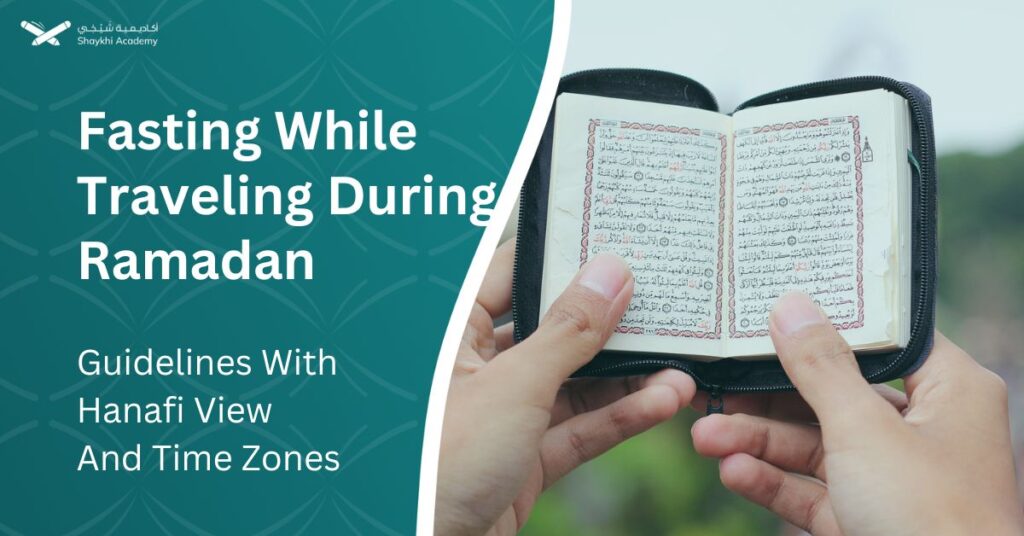
While it’s not prohibited (haram) to fast while traveling, flexibility is encouraged, and breaking the fast is permitted if it poses an undue hardship. The Hanafi school provides specific guidelines regarding fasting while traveling, emphasizing respecting the sanctity of fasting and acknowledging extreme hardship as grounds for breaking the fast.
When traveling across time zones, the fasting person should adhere to the sunset timing of their current location. Ultimately, the traveler has the option to continue fasting until sunset or avail themselves of the concession to break the fast. Shaykhi Academy offers comprehensive Quranic education for both children and adults, providing flexible and affordable courses tailored to individual needs.
Defining Fasting While Traveling Ramadan
Fasting while traveling during Ramadan refers to the observance of Sawm while undertaking a journey that involves significant distances or changes in routine. It encompasses adhering to fasting rituals despite the challenges posed by travel, such as altered meal times, fatigue, and exposure to different environments.
Traveling and Fasting During Ramadan
Muslim travelers often encounter dilemmas regarding fasting obligations and practical considerations while journeying during Ramadan . The interplay between travel and fasting raises questions about continuity, flexibility, and adherence to religious duties.
While the core principle remains the same, traveling introduces additional considerations:
- Travel Distance: Islamic scholars generally agree that a minimum travel distance, typically exceeding 85 kilometers (53 miles), qualifies someone as a “traveler” and allows exemptions from fasting.
- Travel Purpose: The journey should be permissible, such as seeking knowledge, work, or visiting family. Travel for sinful purposes doesn’t grant exemptions.
- Intention: Traveler must intend to break the fast upon embarking on the journey before dawn. If he begins his journey after dawn, he cannot break his fast on that day. However, he is permitted to break his fast on subsequent days if the fourth condition applies.
- Duration of stay: A traveler must not stay at their destination for four days or more, excluding the days of arrival and departure. If the intention is to stay longer than four days, it is not permissible to refrain from fasting except during transit. Upon returning to their home country, the traveler is considered a resident and must fast.
What Are the Valid Exemptions for Not Fasting During Ramadan?
There are several valid exemptions for not fasting during Ramadan, including illness, travel, pregnancy and breastfeeding , elderly and weak, menstruation and pospartum bleeding. These exemptions are based on the understanding that the purpose of fasting is not to cause hardship , but to promote spiritual growth and self-discipline.
This permission is based on the Quranic verse:
“The month of Ramadhan [is that] in which was revealed the Qur’an, a guidance for the people and clear proofs of guidance and criterion. So whoever sights [the new moon of] the month, let him fast it; and whoever is ill or on a journey – then an equal number of other days. Allah intends for you ease and does not intend for you hardship and [wants] for you to complete the period and to glorify Allah for that [to] which He has guided you; and perhaps you will be grateful.” ( Al-Baqarah 2:185 ).
Here are some of the most common exemptions:
- Illness: If you are sick and fasting would worsen your condition, you are exempt from fasting. This includes both physical and mental illnesses. It is important to consult with a doctor to determine if you are well enough to fast.
- Travel: If you are traveling a long distance, you are exempt from fasting. The exact distance that qualifies as “long distance” varies depending on the school of Islamic thought, but it is generally considered to be around 50 miles or more.
- Pregnancy and breastfeeding: Pregnant and breastfeeding women are exempt from fasting because they have additional nutritional needs. They can make up the missed fasts later , or they can feed a poor person for each day they miss.
- Elderly and weak: People who are elderly or weak and unable to endure the fast are exempt. They can make up the missed fasts later, or they can feed a poor person for each day they miss.
- Menstruation and postpartum bleeding: Women who are menstruating or experiencing postpartum bleeding are exempt from fasting. They must make up the missed fasts later.
Is it Haram to Fast While Traveling?
No, it is not haram (not prohibited) to fast while traveling. fasting while traveling is permissible and valid according to the four Imams and the majority of the Sahabah and Tabi’in. If a traveler chooses to fast, their fast is accepted, and there is no obligation to make it up later.
As for which option is better—fasting or not fasting while traveling—it depends on the individual circumstances:
- If fasting and not fasting pose the same level of difficulty, then fasting is preferable. This is supported by the practice of the Prophet Muhammad (peace and blessings be upon him) and his companions, who fasted while traveling.
- If not fasting is easier for the traveler, then they shouldn’t fast. In such cases, fasting may be disliked (makruh) because it entails unnecessary hardship, and rejecting a concession granted by Allah is not encouraged.
- If fasting while traveling causes unbearable difficulty, then it is prohibited (haram) for the traveler. This is indicated by the Prophet’s disapproval of those who continued fasting despite hardship during a journey, as narrated in Sahih Muslim.
Is it Permissible to Fast Voluntarily Fasts While Traveling?
Yes, it is permissible to fast voluntarily while traveling, even if you have a valid reason to break the fast. In fact, some travelers choose to do so for various reasons. Let’s explore the aspects of voluntary fasting while traveling
Always prioritize your health and well-being. If travel conditions make fasting excessively difficult or pose a risk to your health, breaking the fast is the right decision. Consult a doctor if you have any concerns. Be mindful of fatigue and dehydration, especially in unfamiliar environments or harsh climates. Adjust your sleep schedule in Ramadan , plan rest breaks, and prioritize water intake during permitted times.
The decision to voluntarily fast while traveling is ultimately a personal one. Reflect on your intentions, physical well-being, and travel conditions before making a choice.
Hanafi View on Travelers and Ramadan Fasts
The Hanafi school of thought, one of the four major Sunni schools of Islamic law, provides specific guidelines and considerations regarding fasting while on a journey during the holy month of Ramadan.
The Hanafi school places significant weight on the timing of a traveler’s journey . To be eligible for breaking the fast, the journey must commence before dawn . This signifies the traveler’s intent to break the fast from the outset, aligning with the principle of fasting obligation starting at dawn. Traveling after dawn doesn’t qualify as the individual had already begun the day with the intention to fast.
Arriving During Fasting Hours
If a traveler arrives mid-day while not fasting , differing opinions arise. Some scholars argue that the traveler wasn’t obligated to fast initially due to their journey, so they shouldn’t be compelled to abstain for the rest of the day.
However, the Hanafi school adopts a stricter approach. They emphasize the importance of respecting the sanctity of the ongoing fast and aligning with the local fasting community . Even though the traveler wasn’t initially obligated, arriving during the fasting hours necessitates outward and inward abstinence as much as possible. This reflects the spirit of respecting the overall fasting environment.
Breaking the Fast When Hardship Exceeds Limits
While fasting is mandatory, the Hanafi school acknowledges situations where breaking the fast becomes permissible. Extreme fatigue or thirst reaching the point of fearing death, loss of senses, or mental impairment justifies breaking the fast.
This applies to both travelers and residents , including pregnant and breastfeeding women experiencing similar extreme hardship. However, breaking the fast necessitates making up the missed days later. This balance ensures both compassion for those facing hardship and adherence to the core obligation of fasting.
What is the Ruling on Fasting While Traveling Time Zones?
Follow the sunset timing of your destination, this is the core principle.The fasting person should not break their fast until the sun sets in the place where they are currently located, regardless of the time zone difference with their place of departure. This rule applies particularly when traveling westwards, where the sun may set later than in the traveler’s original location. Even if the sun has already set in the traveler’s place of origin, they must wait until sunset in their current location to break their fast.
For example, if someone travels westwards and reaches their destination where the sun has not yet set, they must continue fasting until sunset in that location, even if it means fasting for a longer duration than usual.
This ruling is based on the Qur’anic verse:
“And eat and drink until the white thread of dawn becomes distinct to you from the black thread [of night]. Then complete the fast until the sunset.” [ al-Baqarah 2:187 ].
Options for the Traveler
The traveler has the option to either:
- Continue fasting until sunset in their current location or;
- Avail themselves of the concession for travelers to break their fast.
If the traveler finds it excessively difficult or burdensome to fast until sunset, especially if the day becomes significantly longer due to the time zone difference, they may choose to break their fast and make up for the missed day later after Ramadan has ended.
Unlock the Path to Quranic Mastery with Shaykhi Academy!
Are you seeking the finest Quranic education right from the comfort of your home? Look no further! Shaykhi Academy stands out as a premier online Quran learning platform, dedicated to providing exemplary education to both children and adults.
Why Choose Shaykhi Academy?
- Connect with highly qualified native tutors .
- Flexible scheduling to suit your busy lifestyle.
- Affordable classes tailored for all levels.
- Accessible from anywhere around the globe.
Discover Our Range of Courses:
- Arabic Noorani Qaida : Lay a solid foundation for Quranic studies.
- Online Quran Classes for Kids : Engaging lessons for lifelong learning.
- Tajweed Rules for Kids : Learn to recite with confidence.
- Quran Hifz for Kids : Step-by-step guidance to memorize the Quran.
- Quran for Adults : Introduce yourself to Quran reading and Tajweed rules.
- Online Arabic Courses : Master the language of the Quran.
- Islamic Studies : A wide range of topics related to Islam, including theology, law, Quranic studies, Hadith.
Don’t Miss Out on Your Chance to Excel!
Whether you’re a beginner or seeking advanced knowledge, Shaykhi Academy can guide you! Book your free trial now and make Ramadan 2024 your Quranic turning point!
Conclusion:
Fasting while traveling during Ramadan requires careful consideration of Islamic principles and practical circumstances. While fasting is encouraged as an act of devotion, Islam allows for flexibility and compassion, particularly in situations where fasting poses undue hardship.
Understanding the rules, exemptions, and guidelines provided by Islamic scholars, including the nuanced perspectives of different schools of thought, empowers Muslim travelers to make informed decisions.
Whether choosing to continue fasting or availing oneself of concessions, the primary goal remains spiritual growth and adherence to the core principles of Islam. Shaykhi Academy stands ready to support individuals on their Quranic journey, offering accessible and tailored education to enrich their Ramadan experience and beyond.
Related Posts

Top 10 Quranic Arabic Books With Advantages and Disadvantages
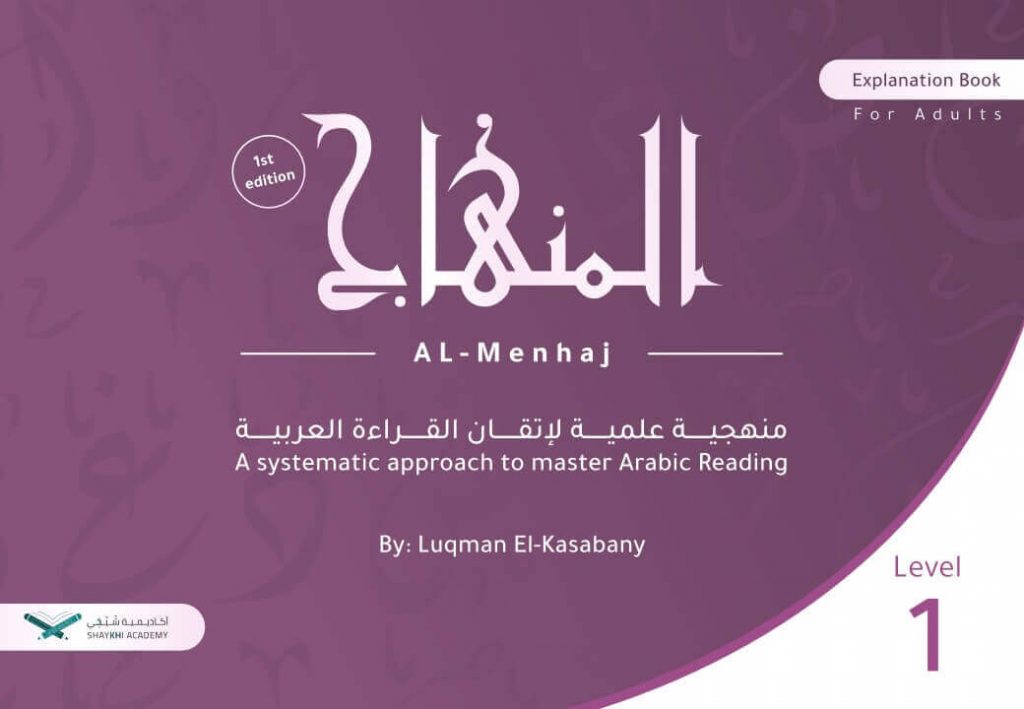
Why Our Strategy to Learn Quran For Beginners Is The Best?
Leave a comment cancel reply.
Your email address will not be published. Required fields are marked *
Save my name, email, and website in this browser for the next time I comment.
About Shakhi Academy

- +20 155 066 8043
- [email protected]
- 85 Great Portland Street, First Floor, London, W1W 7LT

Important Links
- Get a Free Trial
- Recorded Quran Reading Course
- Payment Form (Monthly Subscription)
- New Student's Form
- Who We Are?
- Donate to us!
- Quran Memorization Guides
- Learn Quran Online Guides
- Blog And Articles
- Learn Arabic Guides
- Learn Arabic Reading
- Ramadan Guides
- Give Your Zakat

The Hanafi Way: The Method of Abu Hanifa
This is the seventh article in a series based on the on demand course: the hanafi way: lessons from kawthari’s fiqh ahl al iraq . it lays out the great defense of the hanafi school in the 20th century by imam kawthari..
Appreciating Imam Abu Hanifa’s teaching method gives us many insights into how the Hanafi school works. Imam Abu Hanifa was very much a product of this Kufan tradition. There was a deep concern for Fiqh and its acquisition.
Remarkably, Abu Hanifa did not begin his life as a seeker of knowledge in a general sense. He was a trader. It was only well into his twenties that he dedicated himself fully to knowledge.
The educational milieu in Kufa was one of knowledge and religion. Abu Hanifa took from that. He gathered between fundamental pillars of religious knowledge such as knowledge of the Quran, Hadith, the Arabic language, and fiqh.
Building Deep Understanding
The method of Imam Abu Hanifa in fiqh was not a reprehensible innovation. Rather, it was part of continuity. It was based on the student asking questions and the teacher asking questions, testing his students as a result.
The Prophet (Allah bless him and give him peace) taught by encouraging the asking of questions. He (Allah bless him and give him peace) did not just answer the question. In his answers he gave keys, principles and foundations to build the knowledge, understanding and intellect of the Companions.
The Arabic Heartland
The strength of the Arabic language in this was also particularly important. This was one of the great pillars. There was an emphasis on the preservation of the Arabic language.
The second caliph, Umar, as well as the other Companions, did not like for people to speak other than Arabic.
Kufa and Basra became heartlands of the Arabic language. One of the reasons why was because of the lack of a lot of external mixing there.
A Touch of Praise
Imam Abu Hanifa was blessed by Allah with unique brilliance. Al-Hafidh Abdul Rahman ibn Al-Jawzi, a great Hanbali Hadith master mentioned that people do not differ regarding the understanding of Abu Hanifa or his fiqh. He mentions that Sufyan al-Thawri and Abdullah ibn al-Mubarak would both say:
“Abu Hanifa is the most learned of men.”
Imam Malik ibn Anas, the founder of the Maliki school, was asked, “Have you seen Abu Hanifa?” He replied, “I saw a man, which if he talked to you about this pillar, if he wanted to tell you that it is gold he could convince you.”
Imam al-Shafi‘i said, “People are the dependents of Abu Hanifa in fiqh.”
Continuity
Abu Hanifa did not one day just wake up and decide to teach in the way he did. Rather, it was how he had learned. He distilled that.
There was an urgency to focus on this method. There was a loss of that understanding. Things were becoming more complex as people became increasingly worldly. Abu Hanifa directed himself to synthesize and formalize the teaching method of the people of Iraq.
This method has certain characteristics. It was knowledge based on consultation. There was active enquiry from students to the teacher and the teacher actively engaged them. Training them.
This consultative way of learning was taken by large groups of people from large groups of people back to the Prophet (Allah bless him and give him peace).
Forty Scholars of Fiqh
The school of Abu Hanifa was transmitted uniquely. Ibn Abi al-Awam mentions that the companions of Abu Hanifa who recorded his fiqh were forty accomplished scholars. He refers to them as the most senior of the senior scholars (meaning of that age).
Asad ibn Furat mentioned that the companions of Abu Hanifa who compiled works on the fiqh of Abu Hanifa and transmitted from him were forty scholars.
In terms of seniority of how long they spent with Abu Hanifa, he mentions Abu Yusuf, Zufar ibn Hudhayl, Dawud al-Ta’i, Asad ibn Amr and Yusuf ibn Khalid (one of the teachers of Imam Shafi‘i) and Yahya ibn Zakariya. Each of these had kept his company for decades.
People used to go to Abu Hanifa to seek an answer to a question. The students of Abu Hanifa would present response after response. Then they would raise it to Abu Hanifa and would ask him questions regarding it.
At times, they spent three days going back and forth on the issue and then they would record it. This is one way that explains multiple narrations from Abu Hanifa.
Abu Hanifa’s circle was structured. There was the outer circle of students, then the senior students, then the senior most students and then the senior most of the senior most students which were Abu Yusuf, Muhammad Ibn al-Hasan, Zufar, and al-Hasan.
When questions came he would let the outer circle speak and he would listen. Sometimes he would approve of one line of reasoning or another line of reasoning, and at times people would record that. Then the senior students, then the more senior students. That is how there are secondary narrations from Abu Hanifa.
The Final Opinion
Occasionally, there would be a narration that Abu Hanifa approved of something or voiced an opinion, but that was not necessarily his final opinion on the issue. Whereas what is recorded in Dhahir al-Riwaya expresses (typically) the final opinion of Abu Hanifa.
It is narrated that Abu Yusuf was told once by Abu Hanifa: “O Ya‘qub, woe be to you, do not write everything that you hear from me, because one day I may have this opinion, and then I may leave it, and then I have another opinion, and then I might leave that and have another opinion.”
This refers to this process while the issue was being studied. He may express approval of a line of reasoning but this was the process of getting them to learn and understand. Knowledge is a capacity!
The Process
Why didn’t Abu Hanifa just write a book? His focus was to train. The books of Abu Hanifa are Abu Yusuf, Muhammad ibn Hasan, Al-Hasan ibn Ziyad, Zufar, and all those who took from him. His books are the Hanafi school.
The kind of numbers of students that Imam Abu Hanifa had is mind-boggling. Of the distinctions of Imam Abu Hanifa’s school is that he did not establish his school as his individual opinions. It was based on a consultative process.
Issues would come, the first circle of students would discuss it, then the second, and he would engage them occasionally on it. Till it came to the senior students. They would voice their opinions, and frequently he would express his opinion in approval, sometimes in disapproval of one thing and the other.
The Students
There was active learning and discussion. He did not just go with his opinion. This is part of Imam Abu Hanifa’s taqwa as well. He did not hasten to express his opinion.
This was also part of the training of his students. Sometimes he would remain on the same issue for a month or more (it was not all they would be doing for the month however). The senior most student, Abu Yusuf, would lay down the conclusion.
Abu Yusuf and Muhammad ibn al-Hasan said:
“We never took an opinion ourselves except that Abu Hanifa had said it as well.”
That Abu Hanifa had said it not as a position, but that he had also indicated its soundness.
It is mentioned that no Imam of the Imams of Islam had the number of companions (close students) as did Abu Hanifa and that the scholars, and the general public did not benefit in any way comparable to how they benefited from Abu Hanifa.
Is It True That the Hanafi School Adopted the Shafi’i Method over Time?
Related Posts
Intelligent companionship, mental wellness: principles, satanic tactics: jinn, modesty and dignity.
Accessible to all, supported by you
Learn With Us
- Course Catalog
- Live Schedule
- Student Login
Seek With Us
- Ask a Question
Get to Know Us
- Our Reports
- Privacy Policy
Get Free Courses & Prophetic Guidance in Your Inbox
Email Address *
- Albalagh.net
- AnswersToFatawa
- Arij Canada
- Askimam.org
- Askmufti.co.za
- AskOurImam.com
- CouncilofUlama.co.za
- Darulfiqh.com
- Darulifta Azaadville
- Darulifta Deoband Waqf
- Darulifta-Deoband.com
- Daruliftaa.com
- DaruliftaaMW.com
- DaruliftaaZambia.com
- DarulIftaBirmingham
- Darulihsan.com
- DarulUloomTT.net
- Fatwa-TT.com
- Fatwa.org.au
- FatwaCentre.org
- HadithAnswers.com
- IslamicPortal.co.uk
- IslamicSolutions.org
- Jamia Binoria
- Mahmoodiyah
- Mathabah.org
- Muftionline.co.za
- Muftisays.com
- MuslimaCoaching.com
- Seekersguidance.org
- ShariahBoard.org
- Tafseer Raheemi
- TheMufti.com
- ZamzamAcademy.com
- BinBayyah.net
- Darul Iftaa Jordan
- Shafiifiqh.com
- HanbaliDisciples.com
- TheHanbaliMadhhab.com
- Ask Question
- Lailatul Qadr

Home » Hanafi Fiqh » Qibla.com » Evidences for the distance and time to be considered a traveller
Related Q&A
- For how long is a Traveler Allowed to Shorten and Combine Prayers?
- How to Calculate the Distance Between Two Cities to Know If I Am a Traveler?
- Traveller: The issue of distance within the city of residence or another city
- Becoming a traveller within city limits?
- What Is Considered to Be a City Boundary When Traveling?
- Can a Hanafi Combine Salah?
Evidences for the distance and time to be considered a traveller
Answered by Shaykh Gibril F Haddad
I am working with people who combine and shorten their prayers as soon as they leave the city limits. I, as a Hanafi, follow the Hanafi school and so do not do as they do. I do not repremand them although I think their practice odd. However, they often think I’m being extreme and causing fitna, they also claim Abu Hanifa’s opinion on this was weak. So that I can educate myself and them, could you please explain to me how the school derived the ruilings for the minimum distance to be considered a traveller and the duration of stay to be considered a resident. Also, is there a phenominen that hadith from The Prophet wont have been preserved on something that was commonly known and practiced? E.g. when standing after ruku, it appears every Muslim in history has left their arms by their side, but their appears non textual ‘proof.’

There are four issues in the question:
1. Proof for the minimum distance to be considered a traveller in the Hanafi School
The Musafir or traveller is the Muslim who goes out of his country aiming to reach another country lying at a distance of 88 kilometers or more.
The proof for this is derived from the hadiths which correlate three days’ travel at that time with the status of traveller:
– “The Prophet, upon him blessings and peace, allowed wiping on the leather sock [during ablution] for three days and nights for the traveller.” Sahih Muslim, mass-transmitted according to Imam al-Tahawi in Ma`ani al-Aathaar (1:150).
– In al-Bukhari and Muslim: “No woman travels for a period of three [i.e. three days and nights] except in the company of a mahram.”
Similarly, Malik narrated from Nafi`, from Ibn `Umar that the latter shortened the prayer in Khaybar, saying: “These are three qawasid, i.e. nights.” Sunan al-Bayhaqi (3:136). Likewise in the place called al-Suwayda’ near Madina on the way to Shaam, lying at a shorter distance than Khaybar. Muhammad, Aathaar (p. 34-35) with a sound chain per Ibn Hajar in Aathaar al-Sunan (2:62).
Another time, Ibn `Umar shortened his prayer after travelling to Reem, which lies at a much shorter distance yet. Ibn Hajar, Fath al-Bari (2:476).
The distance travelled at average speed, i.e. on foot and on camelback, over a period of three days with three nights’ rest *at that time* varies, however, it was assessed in the Madhhab as 48 Hashemite miles = 4 burud = 16 farsakh = 88.694 km.
Ibn Hajar in Fath al-Bari (2:466) mentions several reports that Ibn `Umar and Ibn `Abbas would shorten prayer for a distance of 4 burud.
2. The times from which to start shortening the prayer, and end shortening it
The traveller begins to shorten the prayer from the moment he passes the city limits on hiw way out and he resumes completing it from the moment he passes the city limits on his way in.
Abu Hurayra, may Allah be well-pleased with him, said: “I travelled with the Messenger of Allah, upon him blessings and peace, and with Abu bakr and `Umar, Allah be well-pleased with them. Each of them prayed two rak`as from the moment he left Madina and until he returned to it, both on the way and while residing in Makka.” Narrated by Malik cf. al-Ta`liq al-Mumajjad (1:563).
Abu al-Aswad al-Du’ali narrated that `Ali, Allah be well-pleased with him, left to travel out of Basra and prayed zuhr with four rak`as then said: “If we had passed this limit we would have prayed two rak`as.” That is, the country’s limits. Narrated by Abu Ya`la and al-Tabarani. Al-Bayhaqi said Abu Ya`la’s narrators were those of the Sahih. See also Nasb al-Raya (2:183).
`Ali ibn Rabi`a said: “We went out with `Ali ibn Abi Talib, Allah be well-pleased with him, toward al-Shaam and he prayed two rak`as throughout until we returned and saw al-Kufa. At the time of prayer they said: ‘Commander of the Believers, there is al-Kufa, shall we complete the prayer?’ He replied: ‘Not until we enter it.'” Sunan al-Bayhaqi (3:146)
3. The duration of stay to be considered a resident in the Hanafi School
Whoever travels to reach a country to stay in it less than 15 days, or does not intend to stay there 15 days even if he does stay there 15 days or more, must shorten the prayer from 4 to 2.
Anas, may Allah be well-pleased with him, said: “We went out with the Messenger of Allah, upon him blessings and peace, from Madina to Makka, and he prayed two rak`as throughout until we returned to Madina.” He was asked: “Did you stay in Makka for any length of time?” He replied: “We resided in it for ten days.” Narrated by al-Bukhari and Muslim.
Jabir said: “I campaigned with the Messenger of Allah, upon him blessings and peace, to Tabuk and he resided in it between 11 and 19 days, during which he never added to two rak`as until he returned.” Narrated by al-Bayhaqi in his Sunan (3:152).
`Abd Allah ibn `Umar, Allah be well-pleased with both of them, used to complete the prayer whenever he intended to reside 15 days somewhere. Narrated by Ibn Abi Shayba.
`Abd Allah ibn `Umar said, Allah be well-pleased with both of them: “When you travel and you decide to reside somewhere for 15 days, complete the prayer; but if you do not know when you will travel again, shorten it.” Narrated by Muhammad ibn al-Hasan in al-Aathaar. Ibn Hajar said in Aathaar al-Sunan that its chain was sahih hasan. Al-Tahawi narrated the same from Ibn `Abbas. See al-Zayla`i, Nasb al-Raya (2:185).
4. Leaving one’s arms hanging by the sides when standing after ruku`
There is no proof for grasping one’s hands together after ruku` in the prayer whatsoever. As you suggested, it is simply unthinkable that the entirety of the Sahaba, with their meticulousness and precision, would all forget mentioning such a repetitive detail about the First Pillar of Islam after Shahada.
The Prophet, upon him blessings and peace, grasped hands only in qiyam, i.e. standing while reciting the Qur’an, while the point after ruku` is not called qiyam in the texts but i`tidal, i.e. straightening oneself. Indeed, our liegelord `Ali, may Allah ennoble his face, said: “The Messenger of Allah, upon him blessings and peace, when he got up to pray, would say ‘Allahu akbar’ and place his right hand on his left wrist, remaining thus until he bowed, etc.” Narrated by al-Bukhari without chain in his Sahih, and others. Note that he said: “remaining thus _until_ he bowed,” i.e. no longer afterwards.
And Allah Most High knows best.
References: Al-Hadiyyat al-`Ala’iyya (p. 108-113). Al-Ghawji, Arkan al-Islam (1:350-352). Al-Saghurji, al-Fiqh al-Hanafi wa-Adillatuh (p. 276-285). Al-Tahanawi, I`la’ al-Sunan (7:269-322).
Was-Salam, GF Haddad
This answer was indexed from Qibla.com, which used to have a repository of Islamic Q&A answered by various scholars. The website is no longer in existence. It has now been transformed into a learning portal with paid Islamic course offering under the brand of Kiflayn .
Read answers with similar topics:
Random Q&A
Surah muhammad, forgetting in the prayer: a detailed explanation, shari’a stand on keeping the trousers above the ankle, why is allah not answering my supplications for a good husband and a good job, can glass doors be considered as a sutrah, using someone else’s internet connection or network, more answers….
- RE: Insurance Claims
- Wiping over shoes: Wisdom behind it
- I’m an African-American Muslim. I don’t want to marry a woman from my own people because they
- Reciting three extremely short verses and the validity of prayer
- Purpose and Benefit of Zakat
- Witr Prayer: Takbir of Dua-e-Qunoot
Latest Q&A
- Is Makeup Allowed During Iḥrām?
- Do These Actions Formulate Disbelief?
- The Status of a Job Acquired with False Certification
- Can a Ḥanafī Resident Pray Behind a Shāfi’īe Traveller?
- Is it Permissible to Allow Wheelchairs in a Masjid?
- Is an Entry Fee at a Charity Event Considered Charity?
Indexed Websites
Privacy overview.

- Sprituality
- Usul al Fiqh
- Usool al Hadith
- Uloom al Quraan
- Mental Health
- Productivity
- Write for Us
Select Page
All You Need to Know About Abu Hanifa
Posted by Sunnah Insights | Dec 25, 2023 | Culture | 0 |
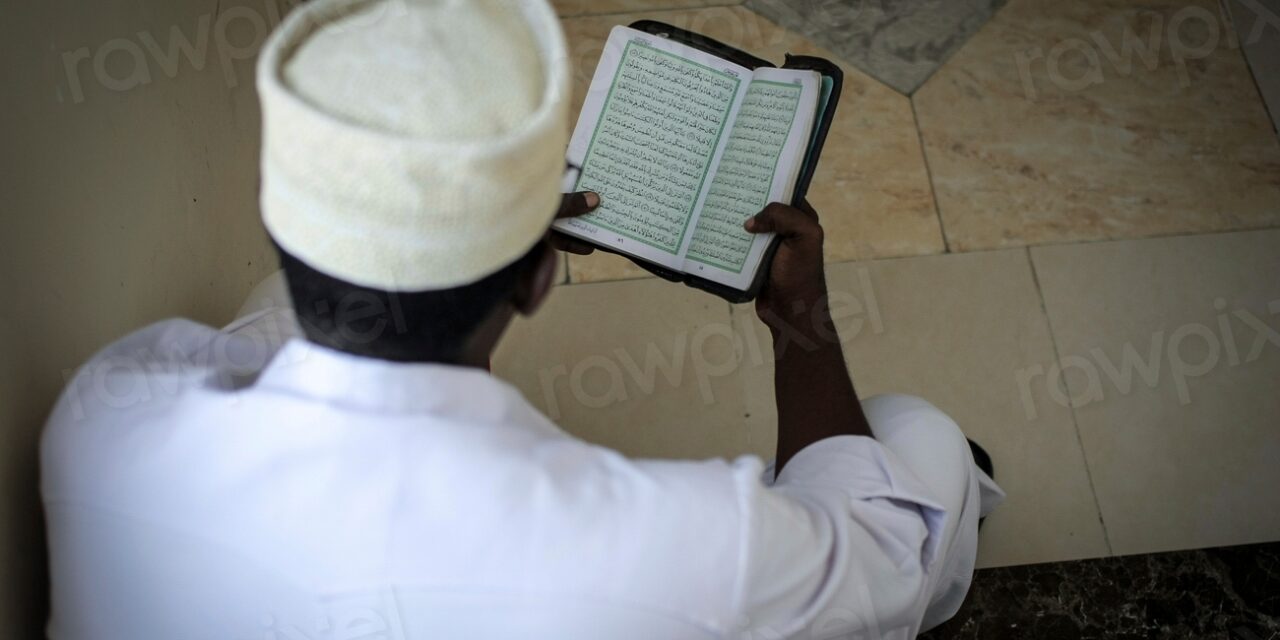
Abu Hanifa, also known as Imam Abu Hanifa, was a prominent Sunni Muslim theologian and jurist who played a pivotal role in shaping the landscape of Islamic jurisprudence. Born in Kufa during the Umayyad Caliphate, he went on to become the eponymous founder of the Hanafi school of Sunni jurisprudence. In this blog, we delve into the life, contributions, and legacy of this influential figure in Islamic history.
Must Have Kitchen Items
Early Life and Ancestry:
Abu Hanifa’s exact date of birth is debated, with some historians suggesting he was born in 61 AH and others pointing to 80 AH. His lineage is thought to have Persian roots, and there are accounts linking him to the Zuṭṭ, a group that migrated to Iraq during the Islamic Golden Age. Despite uncertainties, Abu Hanifa’s intellectual prowess and contributions to Islamic thought remain undisputed.
Educational Journey:
Abu Hanifa’s quest for knowledge led him to travel to the Hejaz region of Arabia, where he studied in Mecca and Medina during his youth. His intellectual journey included attending lectures on jurisprudence by scholars like Hammad ibn Abi Sulayman and possibly learning from Meccan scholar Ata ibn Abi Rabah during Hajj.
Should a Muslim Follow a Madhab?
Contributions to Jurisprudence:
As Abu Hanifa’s career progressed, he gained recognition for emphasizing the use of reason (faqīh dhū raʾy) in legal rulings , a characteristic that distinguished his school of thought. This rational approach extended to his theology, laying the foundation for the later development of the Maturidi school of Sunni theology. The Hanafi school, with its emphasis on reason, consensus (ijma), analogical reasoning (qiyas), and juristic discretion (istihsan), became the most widely practiced Sunni legal tradition.
Challenges and Principled Stand:
In 763, Abu Hanifa was offered the prestigious position of qadi al-qudat (chief judge of the state) by the Abbasid caliph al-Mansur. However, he declined the offer, choosing to maintain his independence. This principled stand led to his arrest, imprisonment, and alleged mistreatment. Despite the hardships, Abu Hanifa continued to teach and influence those around him.
Death and Legacy:
Abu Hanifa passed away in prison on 15 Rajab 150 (15 August 767). The circumstances surrounding his death remain unclear, with some accounts suggesting poisoning due to a legal opinion against al-Mansur . The massive turnout at his funeral reflects the profound impact he had on the Muslim community.
Students and Influence:
Abu Hanifa’s legacy is not only defined by his own contributions but also by the scholars he nurtured. His students, including Abu Yusuf and Muhammad al-Shaybani, went on to become influential figures in Islamic jurisprudence. The Hanafi school’s reach extended across Central Asia, Afghanistan, Iran, Turkey, the Balkans, Russia, Circassia, Pakistan, Bangladesh, India, and parts of the Arab world.
Reception and Criticism:
Abu Hanifa received widespread acclaim during his lifetime and is honored with titles such as al-Imām al-Aʿẓam (“The Greatest Imam”) and Sirāj al-Aʾimma (“The Lamp of the Imams”). However, he also faced criticism, with some attributing discord in the Muslim world to his teachings. Nonetheless, his impact is undeniable, as evidenced by the enduring popularity of the Hanafi school.
Conclusion:
Imam Abu Hanifa’s life and contributions continue to resonate in the Islamic world. His rational approach to jurisprudence, commitment to knowledge, and principled stand against external pressures make him a revered figure. The Hanafi school, shaped by his teachings, remains a significant force in Sunni Islam, influencing millions of followers across diverse regions. Abu Hanifa’s legacy serves as a testament to the enduring power of intellectual and principled leadership in shaping religious thought and practice.
About The Author
Sunnah Insights
Sunnah Insights is a Magazine that curates fresh and already existing articles in order to make a platform of rich information that helps the Muslims and Non-Muslims alike to learn about Islam.
Related Posts

An Appeal to Save Humanity
July 25, 2021

- Gulkand: The Sweet Elixir of Wellness
February 19, 2024

Does Islam Curtail Freedom?
September 24, 2020

Goodness of Kashmiri Walnuts
March 13, 2022
Leave a Reply Cancel reply
Recent posts.
- Is Music Haram in Islam? Yes!
- Top 6 Essential Oils You Must Use Today
- How is shilajit obtained?
- All You Need to Know About Muharram
Recent Comments
- Imran on The Spouses are Like a Garment to Each Other
- Imran Ahmed on How to become a Wali of Allah?
- Himayun on Best Digital Marketing Consultant in Kashmir
- Pradeep on Top Digital Marketing Consultant in Toronto
- Janette on What is Islām?

Moscow Metro – Part 2
Have you been to Moscow ? In all seriousness, they have the prettiest metro stations I have ever seen and I still can’t believe how immaculate and lovely every station was. There are several different stations pictured below and this is the second of several posts where I will show you the beauty of the Moscow Metro. Did you see part 1 ? There really isn’t much to say because I think the pictures speak for themselves. I have so many more pictures to share with you!

Have you ever been to Moscow? Is it someplace you have thought about visiting?
She speaks fluent English, French and Spanish, and works for a major airline. And guess what? She’s also a licensed elementary teacher and has an MBA.
Similar Posts

Have You Crossed This Road Yet?
Do you have any idea what street I’m standing on? I’ll give you a hint…The Beatles took a picture…
5 Ways I Afford To Travel
These 5 things aren’t earth shattering discoveries, they are simple things I do in my everyday life in order…

Pictures From Havana
Here are a few shots I took while I was sightseeing around Havana. Next week I will tell you…

Fabulous Engaged Couple Antoine And Shaunte´
1. How did you guys meet? We met while we were attending college in different states. I was…

Living Abroad In Amsterdam
Have you ever thought about moving abroad? Check out Donielle, the featured traveler this week who is currently living…

Airbnb Rental In Chicago
When I had to fly up to Chicago for a night a few months ago I didn’t want to…
This is the train STATION?? Oh my god… So gorgeous. Moscow has never even crossed my mind as a possible travel destination but this is gorgeous…Hmmm… LOL
I know, right? We spent several hours in the metro, just marveling at the beauty of each one. Thanks for stopping by!
Leave a Reply Cancel reply
Your email address will not be published. Required fields are marked *

IMAGES
VIDEO
COMMENTS
If you stay there for 15 days or longer, you are legally a resident there. When one is a traveler, it is mandatory (wajib) to shorten the obligatory four-rakat prayers (zuhr, 'asr and 'isha) to two rakats. One still prays the sunna prayers though, unless in the midst of a journey and in the rush of travel. If one is a traveler during the ...
1. A person will remain a musafir and will continue offering two rak`ah s for the four- raka`at Salahs until he makes the definite intention of staying at a place for fifteen days or more. 2. The place where he makes this intention is known as his Watan al-Iqamah. He must offer four raka`at Salah here.
THE (QASR) SALĀH OF A MUSĀFIR. 1. When a person qualifies as a musāfir according to the Sharī‛ah he is required to offer two rak‛ahs for the Fard of Zuhr, ‛Asr and ‛Ishā' salāh. The other salāhs remain as normal. 2. More than two rak‛ahs should not be offered for the Fard of Zuhr, ‛Asr and ‛Ishā' salāh.
During travel, apart from shortening, one may also combine two prayers, meaning Dhuhr and ʿAṣr and or joining Maghrib and ʿEshā together. Combining can take place in two forms. Taqdīm/ Haqīqatan and or Taʾkhīr/ Ṣuratan. Taqdīm/ Haqīqatan refers to performing two prayers in one ṣalāh timing. For example, Dhuhr and ʿAṣr are ...
This is the Hanafi opinion in this issue. If it was permissible to practice jam' al-haqiqi in the event of travel or illness, etc. then why is it confined to some prayers only? Why is it not permissible to perform all the prayers of the day together in the morning before departing on a journey? The reason for this is quite simple.
Less than Fifteen (15) days [Hanafi] Less than Four (4) days [Hanbali, Maliki and Shafii] - (Days of arrival and departure are not included) 4- How to do Taqseer (shortening of Prayers): During travel, only Salah with 4 Rakat Fardh is to be shortened, i.e. Dhuhr, Asr & Isha. Travelers should offer 2 Rakat instead of 4 Rakat of the mentioned Salahs.
Number of Rakats While Travelling: Fajr - 2 Fardh. Zuhr - 2 Fardh. Asr - 2 Fardh. Maghrib - 3 Fardh. Isha - 2 Fardh. With regards to the Sunnah and Nafl salat, the travellers had the choice as to whether or not this will be offered. It is advised once the traveller has settled that he should pray the Sunnah and Nafl prayers.
It is also worth mentioning that while praying qasr during travel is highly recommended—some Imams such as Abu Hanifah even consider it as obligatory—during travel, praying Jam` is only allowed while one is actually traveling or pre-occupied with pressing circumstances. Jam` is rare, while qasr is common. A final remark to be made is that ...
I pray this finds you in the best of states. Yes, what counts is the distance, regardless of the means of transportation used or the pace of this travel. [Shurunbulali, Maraqi al-Falah] When you start a journey covering 77 km or more, it becomes mandatory (wajib) to shorten your prayers. [Shurunbulali, Nur al-Idah]
The distance that makes one a traveler. The travelling by which rules change (fasting Ramadan, prayer subset numbers, permissability of female travel, duty of Friday and Eid prayers, duty of slaughtering in Eid, the period for which one may wipe the khuff) is the one for which one intends (i.e. starts travelling wanting) to travel the distance of 3 complete days and nights at the average pace ...
Prayers of a Traveler (Musafir) In Arabic, the word safar means to walk, to travel to any distance. In fiqh (religious terminology), it means to set off with the intention of walking a distance of at least 3 days. A person who sets off with such an intention is called a musafir or safari (traveler). The opposite of safar is iqamah.
The schools concur that the shortening (qasr) of prayers during travel is limited to the obligatory four-rak'ah prayers. Hence zuhr, 'asr and 'isha' prayers will be performed in two rak'ahs, like the morning prayer. The schools differ as to whether qasr is obligatory during travel or if there is an option between it and complete salat? The Hanafis and the Imamis observe: It is obligatory and ...
The Hanafi school of thought - was the earliest of the 4 mentioned, attributed to a student of a sahabah/companion of the Prophet s.a.a.s. However, it was founded in Iraq (intellectual capital of Islamic world) which was criticised by those living in Madinah (city of the Prophet Muhammad s.a.a.s) as having slightly different practises than the more learned ones in Madinah (those in Madinah ...
Reflect on your intentions, physical well-being, and travel conditions before making a choice. Hanafi View on Travelers and Ramadan Fasts. The Hanafi school of thought, one of the four major Sunni schools of Islamic law, provides specific guidelines and considerations regarding fasting while on a journey during the holy month of Ramadan.
The Hanafi Way: The Method of Abu Hanifa. This is the seventh article in a series based on the On Demand Course: The Hanafi Way: Lessons from Kawthari's Fiqh Ahl al Iraq. It lays out the great defense of the Hanafi school in the 20th century by Imam Kawthari. Appreciating Imam Abu Hanifa's teaching method gives us many insights into how the ...
The Hanafi school or Hanafism (Arabic: ٱلْمَذْهَب ٱلْحَنَفِيّ, romanized: al-madhhab al-ḥanafī) is one of the four major schools of Islamic jurisprudence within Sunni Islam. It was established by the 8th-century scholar, jurist, and theologian Abu Hanifa, a follower whose legal views were primarily preserved by his two disciples Abu Yusuf and Muhammad al-Shaybani.
When a person leaves their home city with an intention to travel this distance or further, they will be a considered a legal traveller, and thus it will be mandatory wajib for them to shorten their fard (obligatory) prayers as a concession. The sunnah and witr prayers will not be shortened. There are different opinions found in Hanafi texts on ...
1. Proof for the minimum distance to be considered a traveller in the. Hanafi School. The Musafir or traveller is the Muslim who goes out of his country. aiming to reach another country lying at a distance of 88 kilometers or. more. The proof for this is derived from the hadiths which correlate three.
Hanafi school, in Islam, one of the four Sunni schools of religious law, incorporating the legal opinions of the ancient Iraqi schools of Kufah. The Hanafi legal school developed from the teachings of the theologian Imam Abu Hanifah, as spread by his disciples Abu Yusuf and Muhammad al-Shaybani.
Abu Hanifa (Arabic: أَبُو حَنِيفَة, romanized: Abū Ḥanīfa; September 699-767) was a Sunni Muslim scholar, jurist, theologian, ascetic, and eponym of the Hanafi school of Islamic jurisprudence, which remains the most widely practiced to this day. His school predominates in Central Asia, Afghanistan, Iran (until the sixteenth century), Turkey, the Balkans, Russia, Circassia ...
The Hanafi school's reach extended across Central Asia, Afghanistan, Iran, Turkey, the Balkans, Russia, Circassia, Pakistan, Bangladesh, India, and parts of the Arab world. Reception and Criticism: Abu Hanifa received widespread acclaim during his lifetime and is honored with titles such as al-Imām al-Aʿẓam ("The Greatest Imam") and ...
Ihere is something special about seeing art and beauty while hundreds of feet underground. The metro in Moscow is breathtakingly beautiful, don't you think?
Drive • 1h 3m. Drive from Elektrostal to Moscow 58.6 km. RUB 450 - RUB 700. Quickest way to get there Cheapest option Distance between.